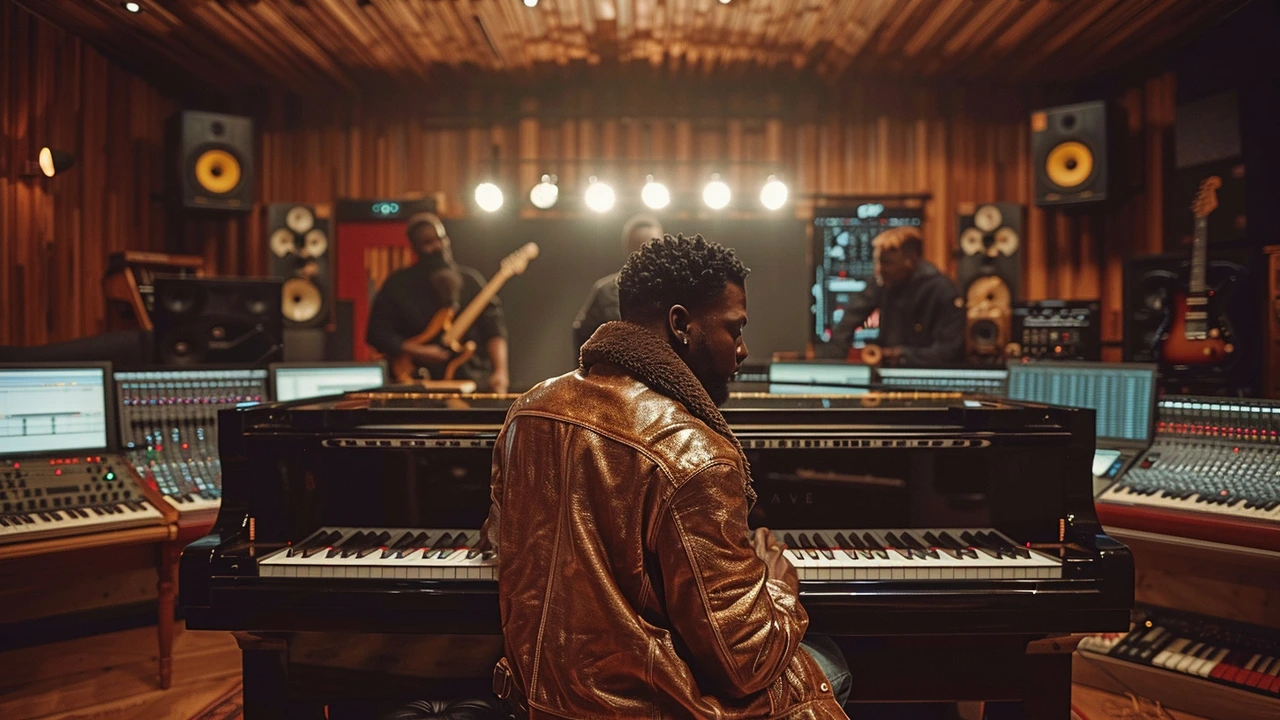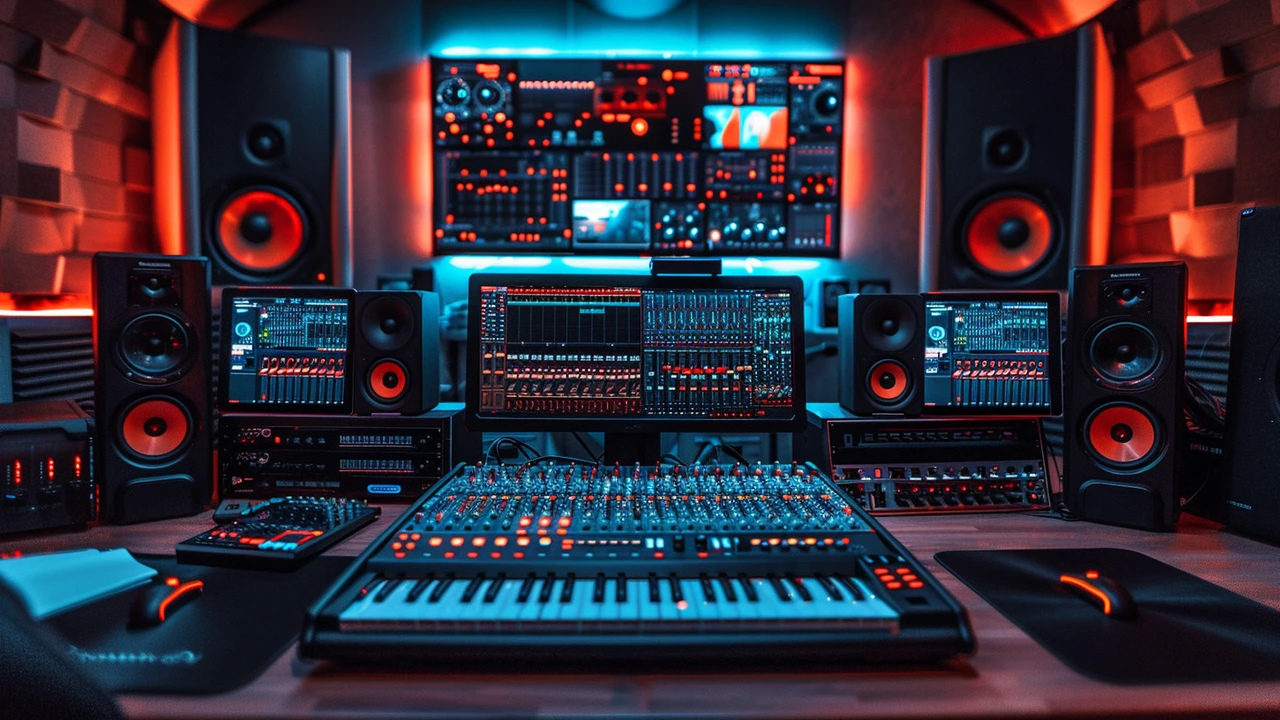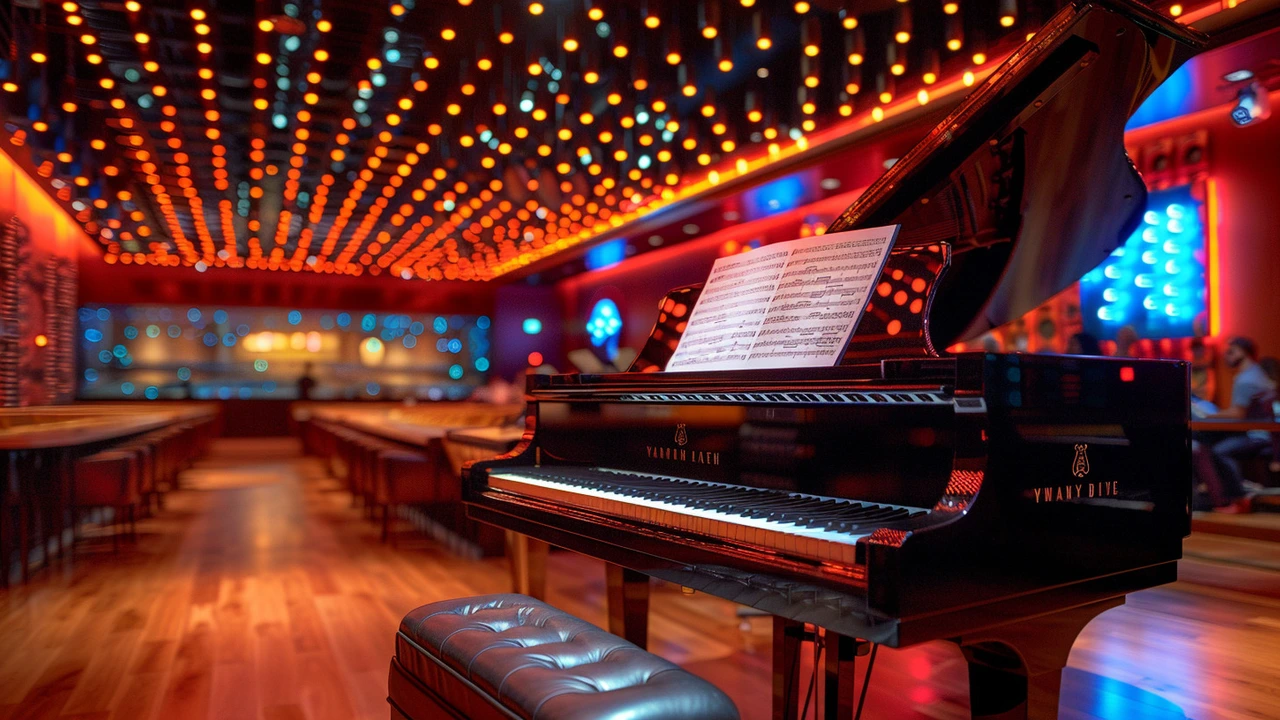The piano has a rich history and a powerful presence in modern pop music. It's not just an old instrument used in classical pieces; it frequently finds its way into today's chart-topping hits.
Its influence began to take shape in the early days of pop music, providing melodies and harmonies that other instruments struggled to emulate. As time went on, the piano became a staple in the recording studio, shaping the sound of countless iconic songs.
Despite being around for centuries, the piano remains relevant, thanks largely to technological advances that have expanded its soundscape. Contemporary artists continue to use it creatively in their music, blending tradition with modern production techniques.
- The Piano's Early Influence on Pop
- Iconic Pop Songs Featuring the Piano
- Technological Advancements
- Piano in Contemporary Pop Production
- Tips for Aspiring Pianists
The Piano's Early Influence on Pop
The humble piano was already a central figure in music long before the dawn of pop. During the 19th century, it became a household fixture, due in part to its range, versatility, and dynamic tonal qualities. Having a piano at home became almost a status symbol, with families gathering around it in parlors to enjoy homemade entertainment. This early popularity paved the way for its integration into more modern music genres like pop.
The transition started with ragtime and jazz in the early 20th century. These genres laid the groundwork for pop music, and the piano was at their core. Artists like Scott Joplin and Jelly Roll Morton revolutionized the soundscape with their intricate melodies and syncopated rhythms. Without these pioneers, the way pop music evolved could have been very different. Even when the phonograph began to eclipse live parlor performances, the piano retained its importance due to its adaptable sound and emotive potential.
In the realm of early rock 'n' roll, the piano's influence is unmistakable. The boogie-woogie style, characterized by its rolling bass lines and energetic right-hand improvisations, fed directly into the upbeat feel of early pop music. Fats Domino, a pioneer of rock 'n' roll, often credited with bridging the gap between R&B and pop, was also a fantastic pianist. His hits such as 'Blueberry Hill' and 'Ain’t That a Shame' exhibit how the piano underpins the entire arrangement, creating a bedrock of rhythm and melody that defines the era.
As the 1960s rolled in, the piano continued to be an essential part of pop music's fabric. The Beatles, known for their innovative approach to songwriting and recording, used the piano extensively. Paul McCartney's famous ballad 'Let It Be' begins with a simple yet powerful piano riff. This song showcases how the instrument can set the emotional tone of a piece, making it deeply resonant and memorable.
Bob Dylan, another legend of 60s and 70s music, also relied heavily on the piano. While often associated with the guitar, songs like 'Like a Rolling Stone' and 'Ballad of a Thin Man' feature prominent piano parts that drive the music forward. Dylan's transition from folk to rock used the piano's adaptability to explore different sounds and styles without losing the essence of his songwriting.
“When I sit down at a piano, I feel at home. There’s a connection that allows me to express what words cannot.” - Elton JohnMoving into the 1970s and beyond, the piano's role kept growing. Artists like Elton John and Billy Joel took the instrument to new heights, proving its versatility and staying power. Their mastery of the piano was central to their identities. For instance, Elton John's 'Tiny Dancer' features a signature piano melody that captures listeners from the first note. Similarly, Billy Joel's 'Piano Man' not just uses the piano as an instrument but also celebrates it through its lyrical content.
Iconic Pop Songs Featuring the Piano
When we think of iconic pop songs, many have a memorable piano riff or melody that sticks with us. The piano's versatility allows it to suit various genres within pop music, from ballads to upbeat hits. One of the most famous examples is Elton John's 'Your Song.' This track uses the piano not just as a background instrument but as the centerpiece, guiding the emotional tone of the song. It’s a perfect blend of simplicity and elegance, demonstrating how just a few piano chords can leave a lasting impact on generations.
Another unforgettable piano-driven pop hit is Adele's 'Someone Like You.' The song's powerful emotions are captured perfectly by the piano, which complements Adele's soulful voice. This track highlights the piano's ability to express deep feelings, making it an essential element in sentimental pop music. According to The Guardian, 'Adele's 'Someone Like You' transformed what could have been a simple ballad into one of the most compelling musical pieces of the decade.'
Then there’s Coldplay's 'Clocks,' where the piano riff is instantly recognizable. The song’s opening piano sequence has become iconic, setting the stage for the rest of the track. What makes it even more interesting is that the piano lines create a repeating motif that contributes to the song's hypnotic effect. This shows how the piano can be both repetitive yet captivating, weaving a spell over the listener.
Moving into the realm of modern pop, Billie Eilish’s 'When the Party's Over' uses the piano in a more minimalist way but still manages to be profoundly affecting. The stripped-back piano arrangement leaves space for her voice to shine, making the emotional impact that much more potent. The success of this song illustrates how the piano's simple notes can have as much power as a full orchestration. Rolling Stone mentions, 'Billie Eilish masters the art of less is more with her piano ballads, especially in songs like 'When the Party's Over.'
Another key example would be Lady Gaga's 'Million Reasons.' Here, the piano is used to evoke a sense of sincerity and vulnerability. The way the piano lines build up along with her voice creates a poignant atmosphere, making the song relatable and emotional for many listeners. This clearly illustrates the piano’s role in bridging the gap between the artist and the audience, offering an added layer of connection.
John Legend's 'All of Me' is yet another exemplary piano-driven pop song. The entire composition is built around the piano, creating an intimate soundscape that complements Legend’s heartfelt lyrics. The song not only achieved massive commercial success but also showed how the piano could anchor a modern love song, making it timeless.
'My piano is not just a tool for making music; it’s an extension of my soul,' John Legend once said in an interview, describing the instrument’s deep personal significance.
Rihanna's 'Stay' is a fairly recent addition to the list of iconic piano-centric pop songs. The piano in this duet, featuring Mikky Ekko, serves as more than a backdrop; it drives the emotional core of the song. The stark simplicity of the piano chords makes the lyrics and vocal performance stand out, which is why this song has resonated with so many people globally.
One last noteworthy mention is Alicia Keys' 'If I Ain't Got You.' The song is almost synonymous with the piano, showcasing Keys’ virtuosity. Here, the piano doesn’t just accompany the vocals but engages in a dialogue with them, creating a dynamic and rich texture. By blending her classical piano training with contemporary pop, Alicia Keys has crafted a masterpiece that remains timeless.

Technological Advancements
The piano has not only survived through the centuries but also thrived thanks to technological advancements. One of the key developments is the introduction of electric pianos and synthesizers in the mid-20th century. These instruments brought a new dimension to the classic piano sound, enabling musicians to experiment with different tones and pitches.
Developments in digital technology have played a massive role. Digital pianos and MIDI controllers allow users to access a range of sounds and effects that were previously impossible. The introduction of software like GarageBand and Ableton Live has made it easier for musicians to compose, arrange, and produce music at a higher level. This democratization of music production has opened the door for many aspiring artists who may not have had the resources otherwise.
Sampling has become another crucial aspect of the piano's influence in modern pop music. Artists frequently sample piano riffs or melodies from existing tracks, creating a sense of nostalgia or adding depth to their new creations. Kanye West, for instance, sampled the piano riff from Elton John's 'Someone Saved My Life Tonight' on his song 'Good Morning'. This melding of old and new has kept the piano relevant and exciting.
Virtual instruments have taken this a step further. Programs like Native Instruments' Kontakt provide hyper-realistic piano sounds that can be manipulated extensively. This not only provides flexibility but also maintains the acoustic charm of a real piano. You can hear this in the works of artists like Billie Eilish, who uses virtual pianos extensively in her productions.
"Technology has not replaced the piano; it has expanded it in ways we couldn't have imagined just a few decades ago." - Hans Zimmer
Even the concert grand piano has seen technological improvements. Modern pianos like the Yamaha Disklavier are equipped with self-playing and recording functions. These pianos can record a performance, store it, and then play it back with remarkable precision. This feature is immensely useful for both training and live performances, adding a level of versatility unprecedented in the instrument’s history.
The integration of artificial intelligence in music is another fascinating development. AI-driven tools can now assist composers in creating music, providing chord suggestions, and even generating entire pieces. Although this is still in its infancy, it holds immense potential for future music creation. Despite these advancements, the essence of the piano remains unchanged. The blend of technology and tradition ensures that this iconic instrument continues to inspire and innovate within modern pop music.
Piano in Contemporary Pop Production
In today's world of music production, the piano remains a pivotal instrument that continues to shape the landscape of modern pop. One reason for this is the piano's incredible versatility. You can find its use in everything from stripped-down ballads to high-energy dance tracks, offering a broad emotional range that few other instruments can achieve. The power of the piano lies in its ability to provide complex, layered sounds without needing heavy accompaniments.
In contemporary pop, the piano often serves as the backbone of a song. It can set the tone and create a mood even before the lyrics come into play. Think about Adele's "Someone Like You," where the simple yet evocative piano melody elevates the song into a deep emotional journey. It's not just about adding layers of sound; the piano can stand on its own, delivering a message that's powerful and resonant.
Technology has played a substantial role in keeping the piano relevant in pop music. Today, digital pianos and MIDI keyboards allow producers and composers to experiment with sounds they could only dream of a few decades ago. These advancements make it easier to incorporate the piano into various genres, whether it's pop, R&B, hip-hop, or electronic dance music. Software like Ableton Live and Logic Pro has synthesized piano sounds that closely mimic the acoustics of a real grand piano, offering immense flexibility to artists.
One fascinating development in recent years is the use of piano loops and samples in electronic music production. These pre-recorded snippets are often tweaked and layered to create entirely new compositions. This approach has democratized piano music, making it accessible to artists who might not even know how to play the instrument but still want to incorporate its robust sound into their creations. Avicii's "Wake Me Up" is a great example, blending the acoustic warmth of the piano with electronic elements to create a chart-topping hit.
Another interesting trend is the rise of bedroom producers who utilize piano plugins to craft pop hits from their own homes. Billie Eilish's "Everything I Wanted" showcases how a simple piano line can be transformed into a multi-dimensional track. With such tools at their disposal, budding musicians can explore the endless possibilities that the piano offers, without needing expensive studio time.
The piano's influence on modern pop is not limited to just the music itself. Many artists are rediscovering the joy of live piano performances, bringing an element of authenticity to their shows. Elton John and Lady Gaga are famous for their electrifying piano performances that captivate audiences worldwide. By incorporating live piano elements, they bridge the gap between recorded music and a live experience, enriching the listener's engagement.
Data reveals the piano's sustained popularity in music production. A study conducted by Fender in 2023 showed that 40% of top-charting pop songs included piano elements. This statistic underscores the piano's enduring significance in the music industry. Whether it's a grand piano or a digital one, this instrument continues to be a vital part of the creative process, allowing musicians to push the boundaries of what pop music can be.

Tips for Aspiring Pianists
Becoming a proficient pianist can be a rewarding journey, blending practice, patience, and passion. The piano isn't just an instrument; it's an avenue for expressing emotions, telling stories, and even shaping the music industry. Whether you're a newbie or seeking to refine your skills, there are several key strategies to keep in mind.
First and foremost, regular practice is crucial. Aim to practice daily, even if it's just for 20 minutes. Consistency will help build muscle memory and deepen your understanding of the piano. It's not about long hours in one day but steady, incremental progress. Use a metronome to develop a strong sense of timing—a critical skill for any musician.
Learning to read sheet music can give you an edge. This skill opens up a world of classical and contemporary pieces that can improve your versatility as a musician. Don't shy away from the basics. Resources such as online tutorials and local music teachers can help demystify the process and make reading music a less daunting task.
While traditional methods are essential, embracing technology can also enhance your piano journey. Apps like Synthesia and Playground Sessions provide interactive ways to learn and practice. These platforms can be especially beneficial for younger learners or those who prefer a more visual and engaging approach.
Playing with feeling and expression is equally important. The piano is an expressive instrument capable of conveying a wide range of emotions. Listen closely to the dynamics in your playing—how hard or softly you press the keys can change the mood of your piece entirely. Practicing different styles and genres can also expand your expressive capabilities.
As Dr. John Mortensen, a professor at Cedarville University, once said, “Practicing expression at the piano is one of the most rewarding aspects of music-making. It turns mere notes into a compelling narrative.”
Networking with other musicians provides inspiration and new learning opportunities. Join online forums, attend local music events, or even participate in piano competitions. These experiences can expose you to different techniques and genres while building supportive communities around you.
Additionally, understanding the mechanics of the piano can improve your playing. Knowing how the pedals affect sound, or how different types of pianos have distinct tonal qualities can inform your playing and choice of instrument. Maintenance knowledge, such as tuning and minor repairs, can also be invaluable.
Recording yourself can be a tremendous aid to your improvement. By listening to your performances, you can pinpoint areas for improvement that you might miss while playing. This feedback loop is constructive and empowering, giving you clear goals to work toward.
Lastly, set realistic goals and celebrate your milestones. Whether it’s learning a new piece, mastering a difficult passage, or performing in front of others, achievements of any scale are worth acknowledging. Progress in learning the piano is often a gradual process marked by small victories.
Enjoy the journey. Staying motivated by the joy and fulfillment that music brings can make your practice feel less like a chore and more like a passion. Remember, every pianist started as a beginner. Your dedication and love for the music will shine through in your playing.

